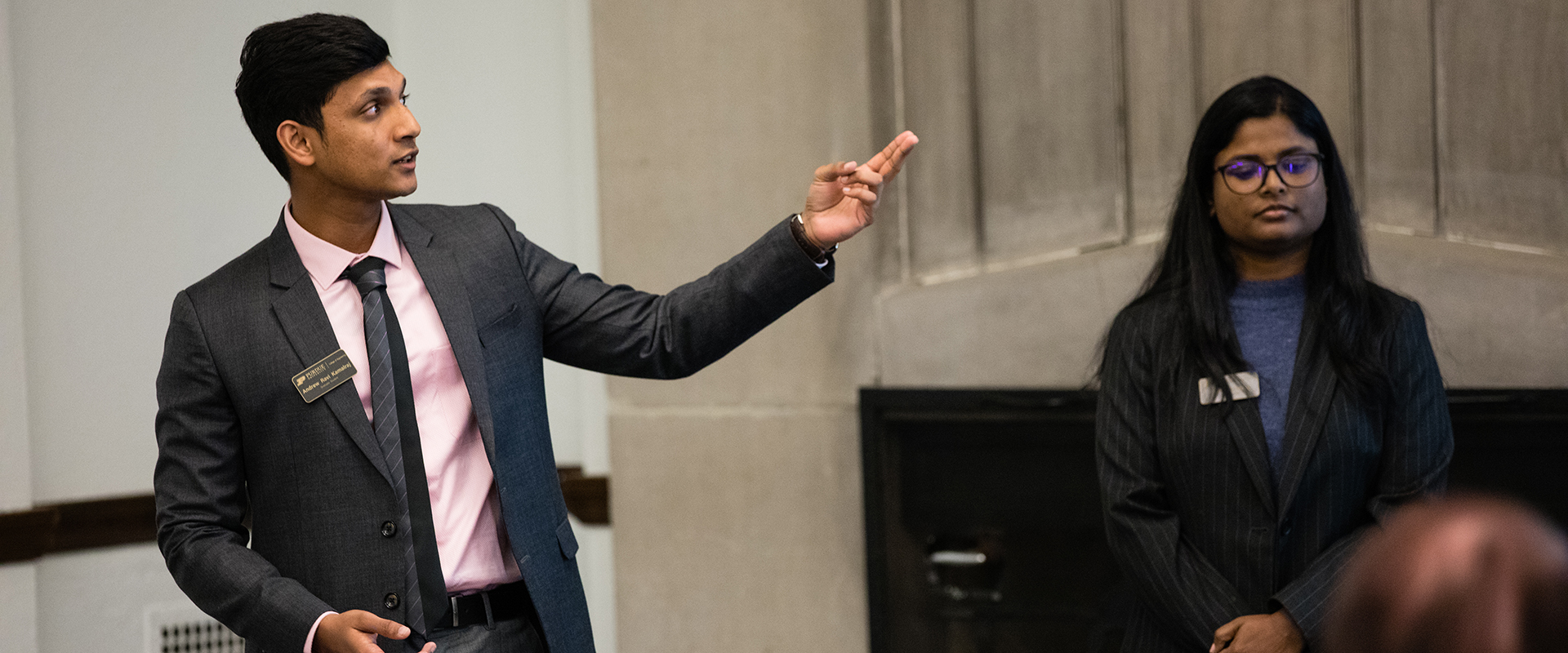
03-03-2023
Thirty teams of students from the Mitchell E. Daniels, Jr. School of Business and Purdue’s College of Engineering focused on diversity and ethics in Indiana’s burgeoning semiconductor industry in the recent Powershift case competition hosted by the Brock-Wilson Center for Women in Business.
As a leader in semiconductor engineering education, Purdue has been tasked with leading the initiative to increase the recruitment and retention of skilled female talent. However, the contrast between women in individual and leadership roles remains significant and reflects the industry’s reputation of gender inequality in the workforce.
“There’s a growing body of research that recognizes companies perform better when they have diversity in their leadership,” says Cara Putman, director of the Brock-Wilson Center. “We need the different perspective and insights that women and minorities bring to companies and teams. That’s why we decided to have students tackle the real challenge of diversity in the semiconductor industry. Who better to consider new ways of recruiting talent than students who aren’t encumbered by the ways we’ve always done things or the constraints we impose on ourselves?”
For this year’s event, the Brock-Wilson Center partnered with the Blake Family Fund for Ethics to present the case. “Diversity and ethics go hand-in-hand and help students think about the larger mix of stakeholders that are impacted by their proposals,” Putman says. “The Blake Family Fund for Ethics also provided key funding that allowed the competition to offer top awards to the winning teams. It was a strong partnership that helped us attract top student teams to the competition.”
The case challenged teams to compile 3-5 recommendations on how Purdue, in conjunction with the Indiana Economic Development Corporation and corporate partners, can create a more gender-diverse and balanced talent pipeline. Teams incorporated a stakeholder analysis of the affected parties, as well as an action plan to increase the representation of women in the semiconductor industry. They presented their findings and recommendations to a group of Purdue alumni, business school faculty and industry partners.
“The teams approached the case from multiple angles,” Putman says. “They gained a broader understanding that all business questions and challenges have an ethical aspect. You can’t separate a business decision from the ethics and impact of that decision. At the School of Business, we’re helping students build that ethics muscle while they are here so they’ll develop it before they enter the workplace.”
Team MEM, comprised of Engineering Management graduate students Akriti Srivastava, Alexandra McGrail, Andrew Ravi Kamalraj and Engineering Management and MBA student Matthew Chang, took home the $4,000 first-place prize.
“We initially relied on the first-hand experiences of the women in our group and the issues they faced in engineering roles,” Chang says. “We were able to leverage what they have seen and heard to develop more robust recommendations that extend past simply resolving generational issues, but identifying tools and resources that both men and women can benefit from in the pursuit of a more gender-diverse workforce, specifically in engineering and the semiconductor industry.”
“I learned a great deal from the students,” says judge and Daniels School alumnus Mike Mullen, vice president of flight operations at Flexjet LLC. “The teams did an amazing job and provided some very impressive suggestions on how to tackle a very challenging problem.”
Daniels School alumna Grace Bultema, a logistics planning analyst at Caterpillar, also served as one of the judges. “I believe it is important for students to learn about ethics since it is so prevalent in today’s society,” she says. “No matter where business students go, they will need to be a part of diverse teams. Learning the strengths and weaknesses of your personal ethics will help you collaborate and work toward the best solution.”
“Exposure to business ethics early and often helps students develop their character and identify who they are and who they want to be,” adds Mullen. “This exposure will help them identify issues that they may encounter in the workforce and give them the experience and fortitude to speak up when something isn’t measuring up.”